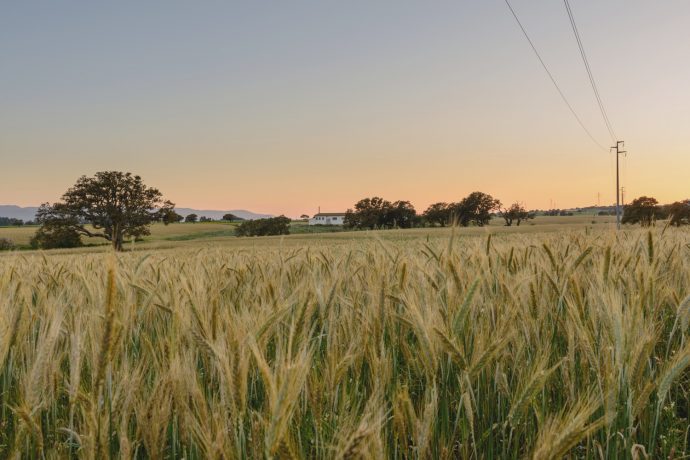It’s strange, driving down a back road through farm country in October when the corn has been harvested and the trees are changing color—and it’s 85 degrees. My mind and body are connected to this land, so after thirty-nine autumns—most of them spent in this part of the world—I recognize that something is different. Something doesn’t feel right.
The three of us drive along the eastern edge of the valley, the windows wide open. She sits quietly in the backseat. He sits in the passenger seat, an old cane leaning between his legs. He lifts a hand and motions towards the harvested field, tells me to turn off of the road. I drive slowly along a rutted tractor lane that separates two fields, the car heaving up and down like a trawling boat.
“Right here,” he says in a quiet, gravelly voice.
Soon we are out in the middle of the field, approaching a quiet grove of trees. We turn and follow the tree line all the way around to the back side, and he tells me to park where the ground sags like the bottom of a wave.
It is a beautiful day. From here, we walk.
A narrow path splits the trees, then navigates the space between the wood and the ten-foot-high, drying corn stalks. They are tan and brittle, and when a breeze blows they rattle like bones, so tall they swallow up the sky.
“I wonder why he hasn’t harvested this corn yet,” he says, reaching out with knowing hands, crumbling a long leaf in between his thumb and forefinger. “Still not dry enough.”
“The deer must be using the trail this year,” his wife says, and then I notice the corn, some of the cobs gnawed off. I follow them along the corn.
“There it is,” he says, and we stop, and the wind is all around us. We stare at a cross pounded deep into the ground, just inside the woods. It is a metal sapling, rusting the color of fall. It is a marker that serves as a reminder of forgiveness, and of a past that the current generations have vowed not to repeat. “There it is,” he says again.
What would I leave behind? What metal crosses have I pounded into my existence? What will the stainless steel letters say about me?
What will we leave behind, when we are gone? I thought of this question the other day when I met with someone who told me the story of how her father died when he was only forty-six years old. He passed in the middle of the night, cause unknown. I will be forty-six a few short years. If I were to die then, what would I leave behind? What metal crosses have I pounded into my existence? What will the stainless steel letters say about me?
The three of us stand there for a bit, the way you do when you are standing in the presence of something holy. She talks about how well the cross is holding up. He grabs the top of it, and the firm way it holds to the earth communicates once again how deeply it has been pounded. He talks about adding a date to the back, in case anyone stumbles on it in the future.
I wonder about that. I imagine someone crossing the field, tripping along the rows, picking their way through the thick undergrowth in that grove of trees, putting a hand up against something that doesn’t yield. They take another look. They see a metal cross with the words Generations and Forgiven. They see a year.
How are we marking our battles? What will future generations stumble across on their way from here to there?
I do not know who turns away first. I know it isn’t me.
I follow them back to the car, and we make our bouncing way back across the field, the dirt road, finally back on the smooth pavement, the sky blue overhead, the warm wind denying fall has ever been here or will ever come back.
A version of this story previously appeared on ShawnSmucker.com.





0 Comments